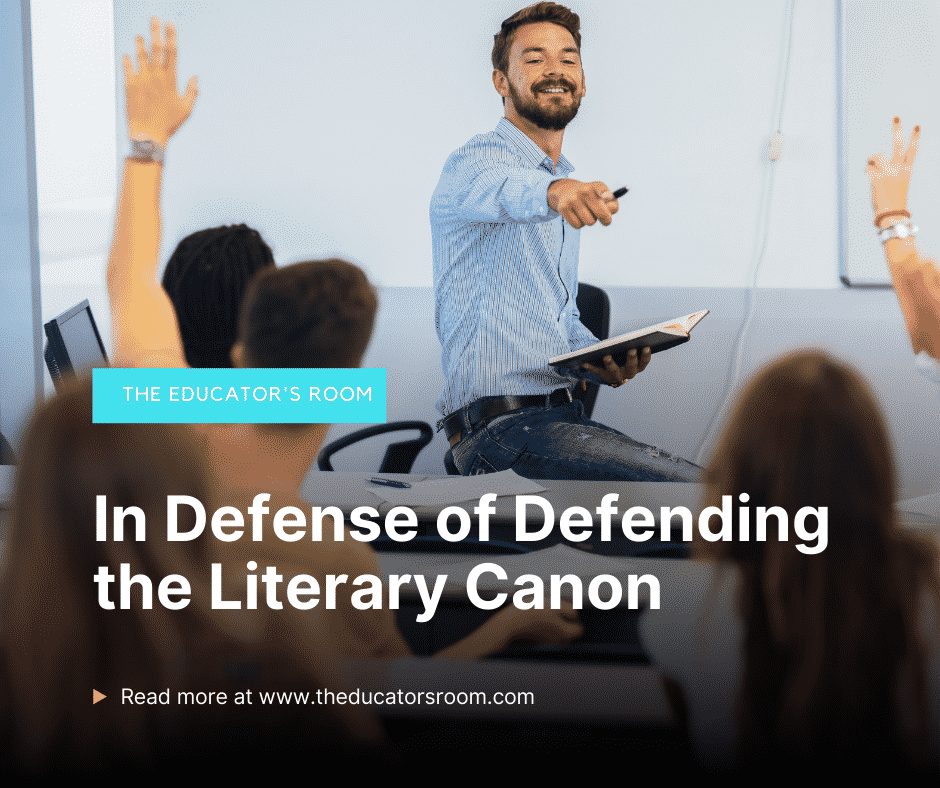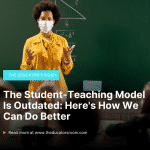
B.H. James is the author of Parnucklian for Chocolate and co-author of A Sea of Troubles: Pairing Literary and Informational Texts to Address Social Inequality and of Method to the Madness: A Common Core Guide to Creating Critical Thinkers through the Study of Literature. He has taught English at Franklin High School in Stockton, CA since 2006.
Every May, I conduct a survey asking the students in my 12th-grade International Baccalaureate (IB) English class to not only rank (from favorite to least favorite) the books we had read that year but also to discuss their favorite and least favorite books over four years of high school English.
For a decade or so, this survey was given on paper. This year, like everything else, it was online.
The works the students were ranking, in August 2020 to May 2021 order, were…
- The Metamorphosis by Franz Kafka
- Medea by Euripides
- Five short stories by Jorge Luis Borges
- Between the World and Me by Ta Nehisi Coates
- Five short stories by Gabriel García Márquez
- The Brief Wondrous Life of Oscar Wao by Junot Díaz
- Hamlet by William Shakespeare
Most of these are works that I had taught before, but last year was my first year “teaching” (explanation of quotations marks 1,007 words away) Díaz’s Oscar Wao. Personally, I first read The Brief Wondrous Life of Oscar Wao the year that it was published, in 2007, and I was blown away by it. As a budding fiction writer and a lifelong reader of fiction, it completely reconfigured my perception of what fiction was capable of—or of the possibilities available to a fiction writer. And, in each of the next twelve years (2008 to 2019), I taught Díaz’s story, “Fiesta, 1980,” from his 1996 collection, Drown.
But, then, one day it happened: a box of The Brief Wondrous Life of Oscar Wao showed up in our school’s bookroom.
My assumption, now that I had the chance to “teach” it (quotation mark explanation now 887 words away), was that it would be a hit. Students would go head over heels for it, just like the twenty-something version of myself did. I therefore also assumed that, when I conducted this survey, Oscar Wao would surely be one of the favorites. It was just so good.
And, besides being so good, it was a book written by a Latinx writer with Latinx characters—my seniors, by the way, are nearly-all (95%) nonwhite, and mostly (72%) Latinx—plus the book frequently mixes Spanish (which many of my students speak at home) with English.
But, despite my hopes and assumptions, The Brief Wondrous Life of Oscar Wao was not the book that, collectively, the class chose as their favorite. In fact, exactly one-third of the class (33.3%), chose Oscar Wao as their least favorite (#7) book. However, the same number of students put the book in their top two (most of those in 2nd).
The two books that tied as the most-often-ranked-number-one were Kafka’s The Metamorphosis and Shakespeare’s Hamlet.
In the survey, I also asked the students to explain why #1 was #1. Here are some of their responses, unedited:
- “Metamorphosis. I just think it was such a cool idea and it’s full of things to annotate and themes and felt like turning into a bug was somewhat relevant to this senior year because people probably felt like that.”
- “I rank Hamlet #1 because of the central theme that I enjoy being explored. I think the idea of action/inaction and to be or not to be is what the world runs on. It is the difference between what we value in the world and what we see vs what never goes seen. I also think that it is an interesting exploration of how thoughts can be paralyzing in most cases.”
- “I picked Hamlet because it was very thought provoking and at some points spoke with me deeply.”
- “The metamorphosis because although it wasn’t long, it was jam packed and the discussions we had after reading the novel were very interesting and provoked more questions.”
- “Hamlet, because Shakespeare Duh”
- “I don’t know why but I really liked the demonstration of capitalism within the novel. I think at the time my family was going through financial issues and I related a lot to the book.”
- “I ranked Hamlet as number 1 because I found the play, assignments, and lectures to be entertaining.”
- “Hamlet is Shakespeare’s best play. Its exploration of death, uncertainty, hierarchical imposition (at least, it was implied) was amazing and very interesting to dissect and analyze. His plays may be shrouded in early modern English, but it is substantive and timeless.”
And, of course, I asked the students to explain why their #7 was #7. Why was Oscar Wao, the book I assumed would be the collective favorite, the collective least favorite? Here are some responses:
- “I ranked The Brief Wondrous Life of Oscar Wao by Junot Diaz as #7 because I feel like we didn’t have enough time to really study and appreciate it.”
- “I chose Oscar Wao because it just did not interest me at all.”
- “The brief wondrous life of Oscar Wao and not because I hated it but just because I enjoyed the others more.”
- “Nothing bad, it just was the least interesting to me.”
- “I ranked The Brief Wondrous Life of Oscar Wao by Junot Diaz as #7 because it felt too misogynistic and I didn’t like the use of the n-word.”
- “I ranked “The Brief Wondrous Life of Oscar Wao” as #7 because I have not really caught up to it. I vaguely remembered anything and I wasn’t very active at that moment.”
- “The Brief Wondrous Life of Oscar Wao was rather annoying to read. Junot Diaz’s use of crass language and footnotes is intrusive to the reading of a rather serious subject of cultural imposition of patriarchal and statist social relations, and the role of learning from history over generations. If I wanted to read footnotes, I would rather read a history book. While it is fiction, most of the characters feel kind of cliché.”
- “The Brief Wondrous Life of Oscar Wao by Junot Diaz, I could not empathize with Oscar. It felt like he just accepted his fate. I did like the linguistic composition of the book.”
I should explain something. One of the IB requirements my students had to complete this past year—virtually, of course—was an oral exam. That exam took two weeks of class time to conduct, so I assigned the students, during those two weeks, The Brief Wondrous Life of Oscar Wao, giving them questions to answer chapter-by-chapter. We did not, however, because of the oral exams, spend time in class discussing the novel. In contrast, we spent a good deal of time discussing and analyzing (close reading!) and writing about and presenting on both The Metamorphosis (our first book of the year) and Hamlet (our last book of the year). So, based on the responses, it seems that at least one reason for the unexpected lack of enthusiasm for Oscar Wao can be blamed on the teaching (or lack thereof): they were not engaged by it because we did not engage with it.
To be clear: my suggestion here is that many students failed to appreciate Oscar Wao because I didn’t really “teach” it; in contrast, students did appreciate Hamlet and The Metamorphosis because I did teach them and we did engage with them.
It’s also worth noting that, though I assumed they would all love Oscar Wao because they would see their lives reflected in it, the responses suggest that at least some students saw their lives reflected in the respective stories of a prince in medieval Denmark and a salesman in turn-of-the-century Prague.
It’s also worth noting, given the ongoing high school English debate over choice vs. classics, summed up nicely in Holly Korbey’s 2019 Edutopia article, The Reading Wars: Choice vs. Canon, that neither Hamlet nor The Metamorphosis are books that many (or any) students would have chosen on their own, but, having been chosen for them—and having engaged with those books through classroom discussion/analysis/debate—they were nevertheless appreciated.
As aforementioned, I also asked the students to pick their favorite book from the past four years of high school English and explain that choice.
Here’s a rundown of the books that this particular class was assigned each year:
Ninth grade:
- To Kill a Mockingbird
- The Things They Carried
- Romeo and Juliet
- The Great Gatsby
- Fences
- Death of a Salesman
Tenth Grade:
- The House on Mango Street
- 1984
- Oedipus the King
- Antigone
- Macbeth
- The Taming of the Shrew
Eleventh Grade:
- The Handmaid’s Tale
- Slaughterhouse Five
- Beloved
- The Merchant of Venice
- The Woman Warrior
- In Cold Blood
For twelfth grade, see above.
And the winner (drumroll, please): The Great Gatsby, the book that, more than any other of the traditionally-taught-high-school novels, seems to have a target on its back cover and which seems to be often characterized as a book that always gets assigned to high school students though high school students hate it. However, one-fourth of this particular high school class chose it as their favorite book over four years, with Beloved and 1984 tying for second and Slaughterhouse-Five not far behind.
So why Gatsby? Here are some responses:
- “I liked doing Gatsby in freshman year because it was so fun to annotate and it’s an interesting story with a bit of historical aspects and also a lot of themes and symbols in there”
- “My favorite was The Great Gatsby because it’s pretty confusing at first but then you understand it the farther along you get in the book. Also, I read it my freshman year and was barely learning all the English literary terms which made it more interesting.”
- “This is tough, maybe the Great Gatsby because it changed how I saw writing”
- “The Great Gatsby because it was the first actual novel that I read. Beforehand I hadn’t really read any novels like the Great Gatsby and it was really interesting talking about all the things happening under the surface/in the background and applying literary terms to it.”
- “The Great Gatsby because I liked the symbolism and overall plot of the novel.”
- “I would say the Great Gatsby, was the most fun reading and learning about.”
- “The Great Gatsby was my favorite novel we read because I could relate to it. The dream of making it, the American Dream that fools everyone.”
- “The Great Gatsby, I have to go with this book because it’s what started us off on the journey to classic literature.”
- “The Great Gatsby. Not that all the others weren’t great, but this was the very first book we studied and my baby brain was mind blown.”
I should note that I was not the teacher with whom these students read The Great Gatsby. This group of students, in their freshman year, were taught Gatsby by my colleague—and wife, and co-author—Elizabeth James. If you’re at all curious about how Liz goes about teaching Gatsby, she wrote a chapter about it in our 2016 book, Method to the Madness: Creating Critical Thinkers through the Study of Literature.
But I can tell you now that Liz does a great job at…
- Teaching “close reading” in a way that is not cute or token or “symbol-hunting” but, rather, as a true deep-dive into the craft of fiction, such that students—their notions of the possibilities in literary arts expanded—often look up and ask, “You can do that?”
- Universalizing the particulars of Gatsby’s experience such that the story of a man who is not part of the in-group—not born a winner—reaches desperately toward his ambition, and in so reaching, risks falling.
So, finally, what does this certainly-un-scientific survey of this probably-statistically insignificant group of students tell us? Here are some humble observations:
- Maybe it’s true that student choice in reading is a good thing (of course it is), but maybe a teacher choosing a book that is a true work of art but that students may never have picked up on their own and perhaps even groaned about at first but that, eventually—through a collective process of reading and re-reading and annotating and discussing and questioning and arguing—a book that the students come to appreciate in a meaningful, memorable way…is also a good thing.
- Maybe “close reading” isn’t a bad thing that sucks the life out of reading. Maybe, for some students, particularly student populations for which expectations are too often too low, it gives reading life.
- Students should absolutely see their lives, their cultures, their experiences, and their selves reflected in the literature that they read, and, in order to achieve this for as many students as possible, teachers should choose (when teachers are doing the choosing) as diverse and as representative a reading list as possible,…
- …but it may also be true that a truly great work of literary art will engage a student and reflect the universality of human life back to them, regardless of the particulars of place, period, or person.




